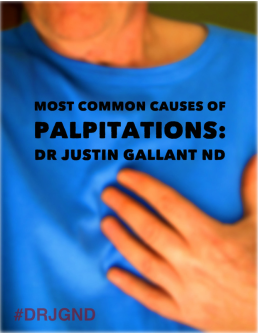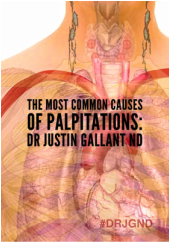Common causes of Palpitations

Click on "Read More" to read the rest of the causes.
Magnesium Deficiency and Palpitations
|
Magnesium deficiency and palpitations: A magnesium deficiency is difficult to test through blood work. I find that even if the serum magnesium or RBC magnesium are within the reference range some patients still benefits from taking a magnesium supplement. If there are other magnesium deficiency symptoms occurring such as calf cramping and muscle spasms you should consult with your MD or ND to determine which type of magnesium you should take and what dose.
|
|
Iron Deficiency and Palpitations
Low Blood Sugar and Palpitations
Anxiety, Panic and Palpitations
Stress and Palpitations
Caffeine and Palpitations
Calcium Deficiency and Palpitations

Vitamin D Deficiency and Palpitations
Hyperthyroidism and Palpitations
Too Much Iodine and Palpitations
Stimulants and Palpitations
High Blood Pressure and Palpitations
Low Blood Pressure and Palpitations
Medications and Palpitations
Alcohol and Palpitations
Heart Issues and Palpitations
Please help raise awareness by sharing this article with your friends facebook and comment below.
If you found this article helpful and would like to get updates whenever I publish a new article, please sign-up for my email list.
Sincerely, Dr Justin Gallant ND
Hamilton, Ontario
 RSS Feed
RSS Feed